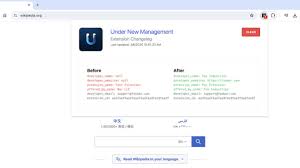In today’s corporate world, the web browser plays a crucial role in daily operations. Because of this importance, security experts are realising it’s time to rethink how we manage and protect browsers.
Just a few years ago, companies relied on various endpoint, network, and cloud solutions to address web risks. But now it’s clear that these piecemeal approaches aren’t enough to keep organisations safe.
As threats evolve, many security teams are looking into a new solution: purpose-built enterprise browsers explicitly designed for security. These browsers offer enhanced protection against web-based dangers.
However, this is still a new area in cybersecurity. There isn’t yet a standard set of best practices or criteria for evaluating these specialised browsers. This gap means that organisations need to stay informed as they explore the best ways to safeguard their online environments.

The browser has become the centrepiece of work for many businesses today. It’s not just a tool for accessing the internet; it’s where employees spend much of their time collaborating through software applications in the cloud and browsing various websites.
Unfortunately, this widespread use also makes browsers prime targets for attacks. Cybercriminals can exploit weaknesses in browser security to gain unauthorised access or deliver harmful files without users even realising it, a practice known as drive-by downloads.
Phishing scams have also taken off recently, tricking users into providing sensitive information through deceptively crafted web pages. Moreover, as web technologies evolve, so do the methods criminals use to manipulate these features, making it harder to spot malicious activity.
Browsers’ dual roles—as essential workspaces and vulnerable entry points—create significant challenges for security teams and everyday users alike. It’s crucial to be aware of these threats while navigating the digital landscape.

Browser Security
Browser security is essential for everyone using the internet, especially in a business setting. It primarily aims to protect two critical areas: preventing unwanted data exposure and shielding against various forms of cyber threats.
First, let’s talk about protecting sensitive information. An enterprise browser implements strict policies to ensure that sensitive corporate data isn’t shared or downloaded carelessly from approved applications. It also prevents employees from uploading company data to non-secure websites when using managed devices.

On the other hand, threat protection focuses on three main types of attacks. The first targets the browser itself, aiming to compromise either the device it’s running on or the data stored within—like cookies and saved passwords.
Secondly, attackers might exploit stolen credentials to gain access to corporate information stored in both approved and unauthorised software applications. Lastly, modern web pages can be manipulated as attack vectors to trick users into revealing their passwords through phishing scams or by altering browser functionalities.
In short, understanding and implementing browser security helps keep both individual users and enterprises safe from numerous online threats.

Choosing the Right Enterprise Browser Solution
When selecting an enterprise browser solution, start by identifying your specific needs. Consider factors like compatibility with existing systems, ease of use, and the flexibility to adapt as your business grows.
Different browsers have different features that can affect your operations. Some are designed for security, while others might prioritise performance or user experience. Understanding these differences is essential to making an informed choice.
Deployment methods also play a critical role. Will you implement it on-premises or in the cloud? Each option has pros and cons regarding control, maintenance, and costs.

User privacy shouldn’t be overlooked, either. You’ll want to ensure that the chosen solution protects sensitive information while providing necessary oversight for compliance purposes.
Lastly, assess potential threats and risks associated with each option. Prioritise them based on how they could impact your organisation’s operations.
Remember, enterprise browsers are relatively new territory. Unlike other security solutions where you can easily ask a peer for advice, many of your colleagues might be facing the same challenges you are right now. Sharing insights could be crucial as everyone navigates this evolving landscape together.
A Closer Look at Enterprise Browsers
An enterprise browser is becoming essential for many organisations today, driven by a few critical needs.
First, there’s the matter of Attack Surface Management. Companies want to proactively reduce their exposure to threats through web browsers, which means making it harder for attackers to exploit vulnerabilities.
Another critical factor is Zero-Trust Access. Organisations are stepping up their authentication processes to ensure that the person using a username and password is genuinely who they claim to be, significantly reducing the risk of compromised credentials.
Furthermore, businesses need robust SaaS Monitoring and Protection. This offers comprehensive visibility into user activities within sanctioned applications—and even those that aren’t approved—providing safeguards against data breaches.

Protection Against Malicious Web Pages is also vital. With constant threats like phishing scams and malware downloads on the rise, real-time detection tools help keep users safe from such dangers as they browse.
Lastly, secure access for Third-Party Users and BYOD (Bring Your Device) is on the radar. Companies wish to allow both employees and contractors secure access to company resources while protecting sensitive information from unmanaged devices.
In summary, a practical enterprise browser helps organisations tackle these challenges, ensuring safer online interactions for everyone involved.
Maxthon
In the world of online browsing, the Maxthon Browser stands out as a highly secure and reliable option. It employs advanced encryption and anti-phishing technologies to protect your personal and financial data from various online threats. One of the standout features of Maxthon is its powerful ad blocker, which effectively eliminates annoying ads, allowing for a smoother and more focused browsing experience.

Maxthon also includes a robust privacy mode designed to keep your sensitive information safe from unwanted attention. This feature acts as a protective barrier, ensuring that no unauthorised individuals can access your data. In today’s digital age, where cyber threats are everywhere, such protection isn’t just excellent to have—it’s necessary.
As you explore the internet, every click could potentially expose your details to others. That’s why it’s crucial to have solid security measures in place. With Maxthon’s privacy mode, users can browse with greater confidence, knowing their activities are shielded from third-party advertisers and hidden from anyone who might try to snoop.
As worries about data breaches and online spying continue to rise, tools like Maxthon become essential for our everyday lives. Ultimately, using Maxthon gives users peace of mind while navigating the complexities of the internet, helping them maintain control over their personal information even as security risks increase. Plus, its built-in ad blocker not only enhances your experience but also contributes significantly to this sense of safety while you surf the web.
